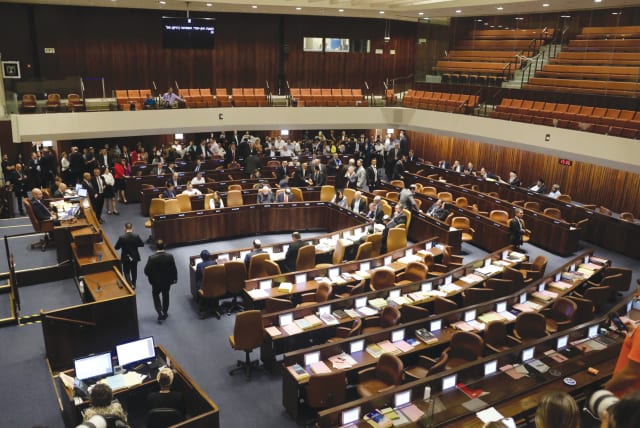Knesset approves first reading of 2024 budget expansion bill

According to Finance Minister Bezalel Smotrich, the change will not increase the state's budget deficit at year's end, since it will be offset by higher-than-expected national income from taxes.
The Knesset on Monday approved for its first reading a bill proposal to expand the 2024 government budget by approximately NIS 3.4 billion.
According to Finance Minister Bezalel Smotrich, the change will not increase the state’s budget deficit at year’s end since it will be offset by higher-than-expected national income from taxes.
The increase in spending will go towards a number of war-related issues, including funding for evacuees and released hostages and their families until the end of 2024; funding for businesses affected by the war; increased funding for combat reservists and their families, and more.
Technically, this move requires two legislative amendments, the first to the Deficit Reduction and Limitation of Budgetary Expense Law and the second to the 2024 Budget Law. The former passed its first reading in the plenum on Monday, and the latter is expected to reach the plenum on Thursday.
UTJ and Otzma Yehudit support bill
The vote passed 58-50 with the support of MKs from United Torah Judaism (UTJ) and Otzma Yehudit, both of whom threatened this week not to support the measure for differing reasons.
Otzma Yehudit demanded that the coalition approve the reappropriation of funds relating to the party leader and National Security Minister Itamar Ben-Gvir in two instances. The party said in a statement on Sunday evening that it had reached agreements with coalition leaders and that the reappropriations would be approved as part of the budget law.
UTJ conditioned its support on the government solving the issue of its semi-private education system. The party wants it to enter a salary agreement called Ofek Hadash that will raise teachers’ salaries, but Finance and Justice Ministry officials have said that the school system does not meet the necessary criteria. The party did not say why it decided to support the measure.
Israel’s budget deficit in the past 12 months true to the end of August reached 8.3%, according to a Finance Ministry report published on Monday. However, Smotrich on Monday reiterated a previous claim that he believed that the deficit would decrease back to the 6.6% limit by the year’s end.
A source close to the matter who opposed the measure explained that the bill, which is known colloquially as a “budget box,” was an appropriate solution for clearly defined, specific expenditures and was used, for example, during the COVID-19 pandemic.
However, in this case, some of the funding was earmarked for reservists, funding that would likely continue in the coming years due to the security situation. A budget box was therefore not appropriate for this purpose, the source explained.
Jerusalem Post Store
`; document.getElementById("linkPremium").innerHTML = cont; var divWithLink = document.getElementById("premium-link"); if (divWithLink !== null && divWithLink !== 'undefined') { divWithLink.style.border = "solid 1px #cb0f3e"; divWithLink.style.textAlign = "center"; divWithLink.style.marginBottom = "15px"; divWithLink.style.marginTop = "15px"; divWithLink.style.width = "100%"; divWithLink.style.backgroundColor = "#122952"; divWithLink.style.color = "#ffffff"; divWithLink.style.lineHeight = "1.5"; } } (function (v, i) { });

